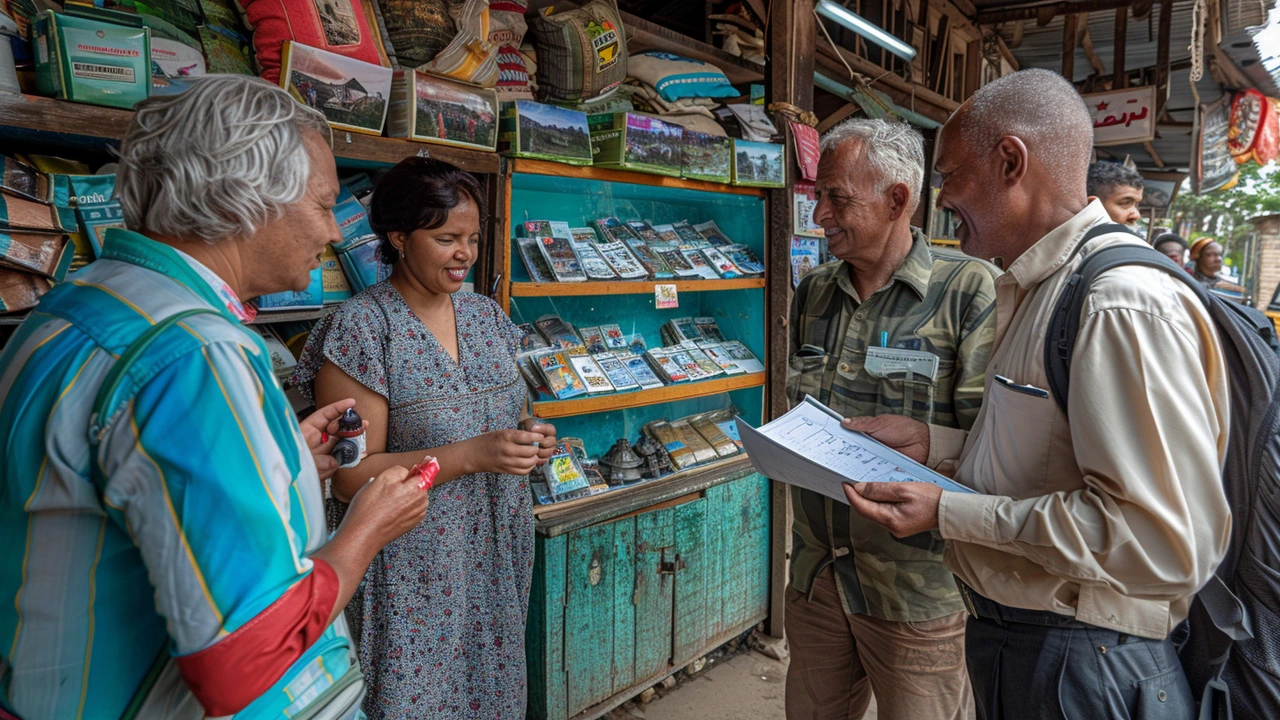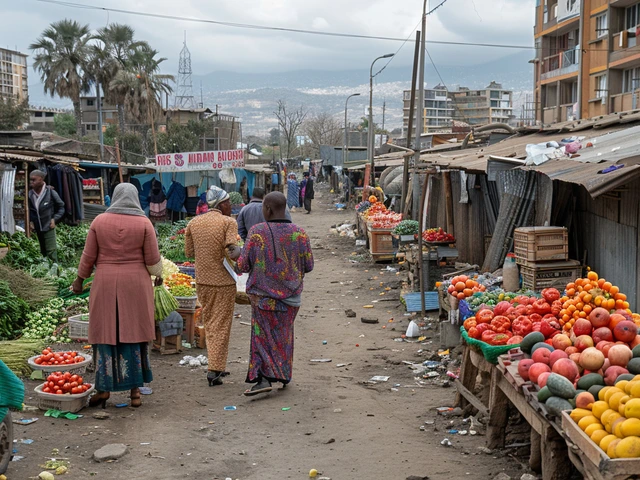Are you thinking about buying real estate in Ethiopia but unsure if it's possible as a foreigner? You're not alone. Many individuals are drawn to Ethiopia's rich culture, growing economy, and beautiful landscapes. Understanding the ins and outs of buying property here can be a bit complex, but we're here to help simplify things.
First, let's consider the legal framework. Ethiopia has specific regulations governing the purchase of property by non-citizens. These laws are primarily designed to protect the nation's interests and ensure that real estate remains accessible to Ethiopian nationals. But don't worry, there are still ways for foreigners to invest in the market.
- Understanding the Legal Framework
- Types of Properties Available
- Navigating the Ethiopian Real Estate Market
- Tips and Considerations for Foreign Buyers
Understanding the Legal Framework
When it comes to buying property in Ethiopia as a foreigner, understanding the legal landscape is crucial. The country has specific laws that govern these transactions, primarily to ensure that Ethiopian citizens have priority access to real estate. Yet, the good news is these regulations do not entirely preclude foreign investment in the property market.
One key aspect to note is that foreign individuals cannot own land outright in Ethiopia. Land ownership remains the exclusive right of the Ethiopian state. Instead, land can be leased for a period ranging from 15 to 99 years depending on the intended use. This leasehold arrangement can be beneficial as it provides a framework for long-term investment without the need for full ownership.
Foreign businesses, particularly those in the manufacturing, agro-industrial, and hospitality sectors, often find these lease terms quite manageable. The Ethiopian Investment Commission (EIC) is the primary entity that handles foreign investments, offering guidelines and support throughout the process. They ensure that the leasing process is transparent and fair for foreign investors.
For those interested in residential properties, the scenario is a bit different. Foreign nationals can purchase a dwelling unit for personal use, provided it forms part of a multi-unit development. These units can include apartments or condominiums within a larger project. This allowance provides some leeway for individuals who wish to live in the country without engaging in lengthy lease agreements typically required for land.
One example includes recently established residential projects in Addis Ababa, where foreign nationals have invested in luxury apartments. These buildings often come with modern amenities and are situated in prime locations, making them highly attractive to expatriates. According to the Ethiopian Real Estate Developers Association, such properties have seen an uptick in foreign interest over the recent years.
“The Ethiopian property market has become increasingly accessible to foreigners, thanks to evolving regulations and supportive investment frameworks,” says a spokesperson from the Ethiopian Real Estate Developers Association.
Additionally, it’s important to adhere to the currency regulations imposed by the National Bank of Ethiopia. Transactions involving foreign nationals must be conducted through a recognized financial institution to ensure they comply with the monetary laws. This can include the initial purchase as well as any lease payments. Engaging with a reputable local real estate lawyer can help navigate these legalities smoothly.
In summary, while foreigners cannot own land in Ethiopia, they can lease land and buy residential units within multi-unit developments. Understanding and adhering to the legal framework is essential for a successful investment. By complying with these regulations and working with local experts, foreign buyers can make informed decisions and tap into the burgeoning Ethiopian real estate market.

Types of Properties Available
When it comes to buying property in Ethiopia, foreigners will find a range of options. The Ethiopian real estate market offers a mix of residential, commercial, and agricultural properties. Understanding what each type entails can help you make an informed decision that suits your needs and investment goals.
Residential property is perhaps the most sought-after type by foreign buyers. These include modern apartments, villas, townhouses, and traditional homes. In bustling cities like Addis Ababa, condos and high-rise apartments are popular due to their accessibility and amenities. Expats often prefer gated communities which provide added security and a sense of community.
Commercial property is also a viable avenue. Ethiopia's booming economy means there's an increasing demand for office spaces, retail shops, and industrial properties. Investors can look for opportunities in up-and-coming business districts or established areas that promise steady returns. Industrial properties, such as warehouses and factories, are especially appealing in cities like Dire Dawa where industrialization is on the rise.
Then, there’s agricultural property. With over 70% of the population engaged in farming, agriculture remains a backbone of the Ethiopian economy. For investors interested in agribusiness, purchasing farmland can be lucrative. You might consider growing popular local crops like coffee, teff, or flowers which are significant export products. However, bear in mind that land in Ethiopia is government-owned and leased rather than sold outright, which affects both residential and agricultural purchases.
One interesting fact: The Ethiopian government's Communa housing project aims to provide affordable homes, creating opportunities not just for locals but also for savvy investors looking at long-term rental income.
Despite the multitude of options, navigating the property market can be challenging without the right tools and knowledge. Ensuring due diligence and understanding the nuances of each property type will undoubtedly make your investment in Ethiopia worthwhile.
"Ethiopia is a land of unique opportunities for property investors, with its unparalleled beauty and growing economy," says Kebour Ghenna, a prominent Ethiopian economist.

Navigating the Ethiopian Real Estate Market
When it comes to navigating the real estate market in Ethiopia, first-time buyers, especially foreigners, may find it a bit overwhelming. The process can be different from what you might expect in countries with more established real estate markets. However, with the right guidance and resources, you can successfully find and purchase property in Ethiopia.
One of the first things you need to do is to understand the local market conditions. Real estate in Ethiopia is growing, but it is still developing. You'll find opportunities primarily in urban centers such as Addis Ababa, the capital city, which is seeing a construction boom. Knowing where to look and what to expect can make your search much more effective.
“The Ethiopian real estate market is ripe for investment,” says Daniel Getahun, a real estate expert in Addis Ababa. “While it can be challenging, the potential returns are significant if you understand the market dynamics.”
It's essential to find a reliable local real estate agent. A good agent can help you navigate the complexities of the market, provide insights on the best neighborhoods, and assist with the legal paperwork required for property transactions. Make sure to choose an agent with a good track record and reliable references.
The next step is to get familiar with the types of properties available. In Ethiopia, you can find everything from modern apartments and villas to commercial buildings and plots of land. Each type has its own set of advantages and challenges, so it's crucial to decide what kind of property fits your needs. For instance, buying land might be more complex as it involves different legal processes compared to purchasing an apartment.
Once you've decided on the type of property, you'll need to conduct thorough due diligence. This includes verifying the property's ownership, checking if there are any disputes or liens, and ensuring that the property complies with local zoning laws. It is prudent to hire a local lawyer who specializes in real estate to assist in this process. Legal fees in Ethiopia are relatively affordable compared to Western standards, making professional assistance a worthwhile investment.
Another important aspect to consider is how you will finance your purchase. While some foreigners might have the cash to buy property outright, others might need to explore financing options. Ethiopian banks offer mortgage loans to foreigners, but the process can be lengthy and complex. Having a solid financial plan is crucial to avoid any delays or unexpected issues.
Finally, it's beneficial to network with other expatriates or locals who have already gone through the process. They can provide invaluable advice, share their experiences, and even recommend trustworthy professionals. Joining online forums, attending local meetups, or participating in community events can be good ways to build these connections.
Here is a brief summary of key steps for navigating the Ethiopian real estate market:
- Understand the local market conditions and focus on urban centers.
- Find a reliable local real estate agent with good references.
- Decide on the type of property that fits your needs.
- Conduct thorough due diligence with the help of a local lawyer.
- Explore financing options if needed; plan your finances accordingly.
- Network with expatriates and locals for additional support and advice.
Buying property in Ethiopia as a foreigner might come with its unique set of challenges, but with careful planning and the right resources, it can be a rewarding investment.

Tips and Considerations for Foreign Buyers
Buying property in Ethiopia as a foreigner requires careful planning and due diligence. Here are some tips and considerations to keep in mind:
Legal Restrictions
First and foremost, be aware of the legal restrictions in place. Ethiopian law generally does not allow foreigners to own land directly. However, they can lease land for up to 99 years for commercial, agricultural, or business purposes. This means that if you are interested in building a business or investing in agricultural activities, Ethiopia can still be an attractive option. It's crucial to engage with local legal experts who can help navigate these regulations and ensure you are compliant with all local laws.
Choosing the Right Property
Your needs and goals will determine the type of property that's best for you. For instance, if you aim to establish a business, you might need commercial land or office space. Alternatively, if you are interested in the agricultural sector, you'd be looking for farmland. It’s important to do thorough research or work with a trusted local real estate agent to find properties that meet your specific needs and comply with legal requirements.
Engage a Reliable Real Estate Agent
Working with a reliable real estate agent can make a significant difference. An experienced agent will not only help you find the right property but will also guide you through the complex paperwork and legal procedures. Make sure to choose an agent with good references and a solid reputation.
Due Diligence
Due diligence is a must when buying property in Ethiopia. Verify the legitimacy of the property title and ensure that the seller has the right to sell the property. It's also wise to investigate any existing disputes over the land. Hiring a local lawyer who understands the intricacies of Ethiopian property laws can be immensely helpful here.
Consider the Local Market
The Ethiopian real estate market can differ greatly depending on the region. Urban areas like Addis Ababa may have a more competitive and established market, while rural areas might offer more affordable and potentially profitable opportunities. Research the local market trends and consider future developments that might affect property values.
Financing
Securing financing can be another challenge. Ethiopian banks might have restrictions on providing loans to foreigners. Consider alternative financing options, such as partnerships, private lenders, or international financing institutions that specialize in emerging markets.
Understand the Culture and Language
Understanding the local culture and language will go a long way in facilitating smooth transactions. Ethiopians value trust and relationship-building. Learning some basic phrases in Amharic and showing respect for local customs can help establish good rapport with sellers and other stakeholders.
"Investing in Ethiopian real estate requires a cautious and informed approach. Foreigners must accept that they are navigating a different legal and cultural landscape." – Samuel Getachew, Ethiopian Real Estate Expert
Plan for the Long Term
Finally, think long-term. Real estate investment is often about finding the right opportunity and patiently working through the legal and bureaucratic processes. Keep in mind that Ethiopia's real estate sector is still developing, and it may take time for your investment to yield significant returns. However, with the country's growing economy and increasing interest from international investors, the potential upside is considerable.

 5 Booming Careers You Should Consider for a Bright Future
5 Booming Careers You Should Consider for a Bright Future
 Is Ethiopia a Good Place for Business Investment in 2024?
Is Ethiopia a Good Place for Business Investment in 2024?
 Discover Ethiopia's Vibrant Language Landscape for Career Prospects
Discover Ethiopia's Vibrant Language Landscape for Career Prospects
 Making Money on YouTube in Ethiopia: A Practical Guide
Making Money on YouTube in Ethiopia: A Practical Guide
 Most Common Jobs in Ethiopia Revealed
Most Common Jobs in Ethiopia Revealed
grace riehman
May 28, 2024 AT 17:36If you're thinking about moving to Ethiopia, the lease‑hold system is the first thing to get comfortable with.
It means you won't own the land outright, but you can secure a long‑term lease up to 99 years.
That gives you enough time to build a home or set up a business without worrying about sudden ownership changes.
Most expats find this arrangement works well once they understand the paperwork.
Working with a local lawyer can smooth out the process and keep you from tripping over hidden clauses.
Don't forget to check the currency regulations so your payments go through a recognized bank.
Overall, the system is designed to protect both the state and foreign investors.
Vinay Upadhyay
May 29, 2024 AT 15:40Your oversimplification of lease terms reads like a draft riddled with grammatical sins.
First, you claim "you won't own the land outright," which is a vague statement bordering on a tautology.
Second, the phrase "up to 99 years" should be accompanied by a precise legal definition, not a casual shrug.
Third, you neglect to mention the mandatory approval from the Ethiopian Investment Commission, a critical detail that cannot be brushed aside.
Finally, your advice to "check the currency regulations" is as bland as it gets; specify the National Bank's requirement for foreign exchange approvals.
In short, your attempt at simplification does a disservice to readers seeking accurate guidance.
Eve Alice Malik
May 30, 2024 AT 12:30The legal landscape in Ethiopia can feel like a maze, but breaking it down piece by piece makes it manageable.
First, understand that the state owns all land, which means foreigners can never hold a freehold title.
Instead, you operate under a leasehold system where the lease can stretch from fifteen to ninety‑nine years depending on the project's nature.
This arrangement is especially common for commercial ventures such as factories, hotels, and large‑scale farms.
Residential options are a bit different; you can purchase a unit inside a multi‑unit development, like an apartment block, without needing a separate land lease.
The key is that the building itself is owned by a private developer, while the underlying land remains state‑held.
Before you sign anything, enlist a reputable Ethiopian lawyer who knows the intricacies of land lease contracts.
The lawyer will verify that the lease terms comply with both the Investment Commission's guidelines and the national land policy.
Next, be aware of the currency rules enforced by the National Bank of Ethiopia; all foreign‑currency transactions must flow through authorized banks, and you may need to obtain a foreign exchange permit.
These permits are generally straightforward if you have proper documentation, but skipping them can lead to severe penalties.
Another practical tip is to work with an established local real‑estate agent who has a track record of handling foreign clients.
The agent can help you locate properties that are already cleared for foreign investment and avoid dubious deals.
When evaluating a property, always request a title search to confirm the developer's right to lease the land and construct the building.
If you're eyeing agricultural land, remember that the lease will be tied to a specific use, such as coffee or tea cultivation, and changing the purpose later may require additional approvals.
Finally, keep an eye on upcoming infrastructure projects, because government‑led road or rail expansions can dramatically affect property values in the surrounding areas.
Debbie Billingsley
May 31, 2024 AT 09:20While you paint a rosy picture for foreigners, the reality is that Ethiopian sovereignty over land is non‑negotiable.
The lease system is deliberately structured to prevent any erosion of national control.
Foreign investors must accept that they are merely tenants, not owners.
Any attempt to sidestep these rules undermines the country's development agenda.
Therefore, prospective buyers should prioritize projects that align with national priorities rather than seeking loopholes.
Patrick Van den Berghe
June 1, 2024 AT 06:10The biggest hurdle is finding a trustworthy agent
Josephine Gardiner
June 2, 2024 AT 03:00Identifying a reliable real‑estate intermediary is indeed paramount, as the agent's due diligence directly influences the integrity of the transaction.
It is advisable to verify the agent's licensing status with the Ethiopian Real Estate Developers Association and to request references from previous foreign clientele.
Such measures mitigate the risk of fraudulent activities and ensure compliance with statutory requirements.
Jordan Fields
June 2, 2024 AT 23:50Good luck.
Divyaa Patel
June 3, 2024 AT 20:40Imagine the land as a living tapestry, each thread woven by centuries of tradition, awaiting the curious eye of an outsider.
Larry Keaton
June 4, 2024 AT 17:30That metaphor captures the essence of Ethiopian real estate - it's rich, vibrant, and demands respect.
When you step onto this tapestry, bring patience and an open heart, and the colors will reveal themselves.
Connecting with local experts helps you read the patterns without tearing the fabric.
Liliana Carranza
June 5, 2024 AT 14:20Your description is like a sunrise over the highlands, full of promise and warm hues.
Let’s channel that energy into finding a property that not only fits your budget but also resonates with the spirit of the place.
Remember, the journey is as rewarding as the destination when you honor the community and its heritage.
Jeff Byrd
June 6, 2024 AT 11:10Sure, just buy a plot, ignore the lease rules, and hope the government forgets you exist.
Joel Watson
June 7, 2024 AT 08:00While the whimsical suggestion may elicit a chuckle, it grossly underestimates the intricate regulatory framework governing foreign investment in Ethiopia.
Such flippancy could lead potential investors to overlook essential compliance steps, resulting in costly legal repercussions.
A more measured approach, grounded in statutory awareness, is indispensable for any serious venture.
Chirag P
June 8, 2024 AT 04:50I appreciate the nuanced clarification; adhering to the proper channels not only safeguards the investment but also respects Ethiopia's sovereign policies.